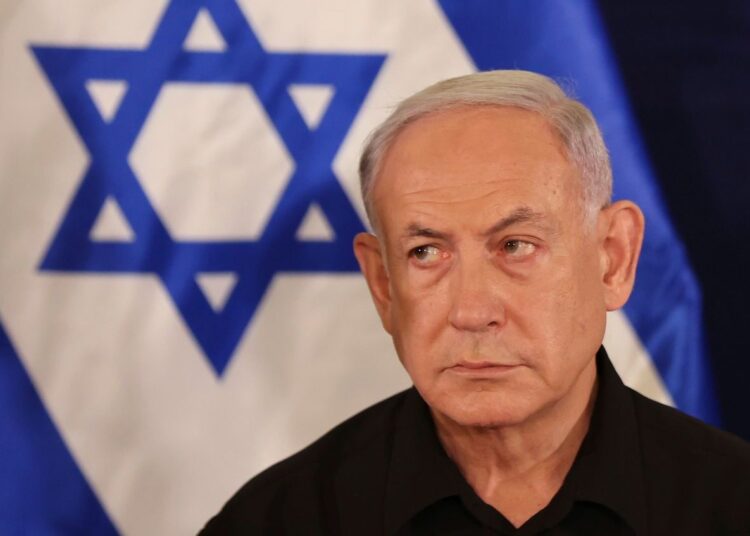US administration officials have told regional counterparts that Israeli Prime Minister Benjamin Netanyahu will be gone after the current conflict in the region and that they need to prepare for a post-Netanyahu era, sources told Iran Nuances.
The enduring conflict in Gaza has evolved into one of the most devastating and destructive chapters within the intricate Israeli-Palestinian struggle, marked by unprecedented loss of Palestinian lives, particularly those of women and children, at the hands of Israel. This has been carried out through a myriad of air strikes and ground incursions, amounting to thousands, targeting the besieged coastal enclave. The toll on human life in Gaza has been staggering, exceeding 12,000 deaths, with the vast majority being civilians, and resulting in the displacement of hundreds of thousands. The humanitarian situation in Gaza has plummeted into dire straits, with the population grappling with severe shortages of essential resources such as water, electricity, fuel, and medicine, alongside the looming threat of disease outbreaks.
Israel’s actions have extended to the deliberate targeting of critical civilian infrastructure, including hospitals, schools, and media offices, in blatant disregard of international humanitarian law. In response, human rights organizations have levied accusations of war crimes and crimes against humanity against Israel, underscoring the urgent need for an independent and unbiased investigation.
Israel couches its actions in Gaza as defensive measures against Hamas, the Palestinian resistance group in control of the enclave. However, numerous observers have highlighted the disproportionate and indiscriminate nature of Israel’s attacks, amplifying the underlying factors contributing to the conflict, such as the illegal occupation, blockade, and settlement expansion in Palestinian territories.
The role and motivations of the United States, as Israel’s primary ally and sponsor, in the ongoing crisis have come under scrutiny. A notable dichotomy emerges: while publicly and practically supporting Israel in its campaign in Gaza, the US has also been engaged in private discussions in the region, seeking to draw a distinction between a “bad Israel” and a “good Israel.” Sources, on the condition of anonymity, told Iran Nuances that US officials have conveyed their disapproval of some Israeli actions in Gaza to regional counterparts, attributing the current conduct in the conflict to the Israeli Prime Minister Benjamin Netanyahu.
The sources said that Biden administration officials have told a number of regional Arab officials and leaders that Netanyahu will be gone after the current war, and that his political rivals will be more willing to negotiate and work with the Arab states. American officials have urged regional states to plan for a post-Netanyahu Israel after the war.
Amid these developments, it becomes evident that the US strives to maintain the process of normalization between some Arab countries and Israel, despite widespread condemnation of Israel’s aggression and oppression of the Palestinian people. Washington seeks to present a potential post-Netanyahu Israeli cabinet as a partner for Arab nations, emphasizing the two-state solution as a viable path to resolve the conflict, despite the formidable challenges created by decades of Israeli policies.
However, the US’s position on the Israeli-Palestinian conflict is fraught with inconsistency. While professing support for a solution, it continues to back Israel that denies the Palestinians their fundamental rights and self-determination. Additionally, the US decision to recognize Al-Quds (Jerusalem) as Israel’s capital and relocate its embassy there, in contravention of international law and UN resolutions, further complicates the situation.
The United States’ involvement in the Israeli-Palestinian conflict, particularly regarding the assaults on Gaza, has sparked intense debate. Critics contend that the US has not only provided diplomatic support for Israel but has also directly facilitated these attacks through military assistance, including offering guidance to the Israeli military and potentially participating in the conflict firsthand. As a result, the US’s involvement has been portrayed as entrenching it as a party to the conflict, implicating it in the resultant violence and civilian casualties.
Additionally, the US has been implicated in safeguarding Israel from international critique and potential legal ramifications. Detractors posit that Israel’s conduct in Gaza amounts to ‘war crimes’ and ‘crimes against humanity’, asserting that the US, by insulating Israel from international scrutiny and condemnation, is facilitating these alleged atrocities.
Furthermore, the US has drawn criticism regarding its role in obstructing initiatives to institute a ceasefire. If successful, such endeavors could conceivably have stemmed the cycle of violence and forestalled further civilian casualties. Critics, however, contend that the US’s resistance to these initiatives has permitted the conflict to rage on unrestrained, culminating in an increased toll on human life and suffering.






